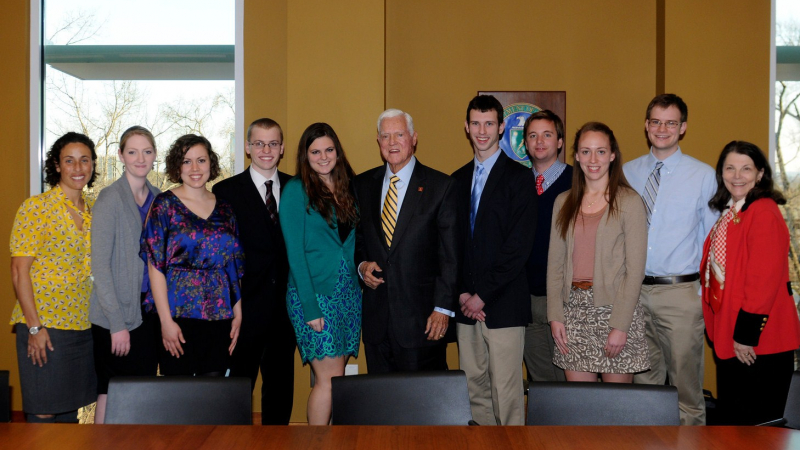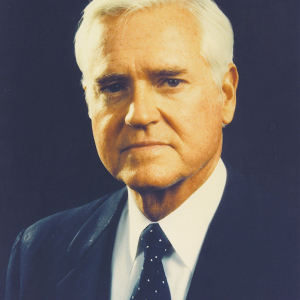Tribute to a champion of ocean conservation and NOAA science.
Over his long career in state and federal politics, Senator Ernest “Fritz” Hollings of South Carolina was a champion for ocean policy and conservation. When Senator Hollings retired in 2005, the Ernest F. Hollings Scholarship was established in his honor to bolster undergraduate training in NOAA mission sciences, as well as increase environmental literacy.

Senator Hollings served in the U.S. Senate for 38 years, from 1966 to 2005. He began his political career representing Charleston in the South Carolina House of Representatives (1949-1954); he was elected Lieutenant Governor for the state for one term, and at the age of 36, was elected Governor of South Carolina in 1958. He was then elected to represent South Carolina in the U.S. Senate in 1966.
Emphasizing "practical conservationism," Senator Hollings spearheaded an extraordinary range of laws to safeguard America's coasts and oceans, including many of the seminal environmental laws of the 1970s. In 1970, Senator Hollings played a major role in the establishment of the National Oceanic and Atmospheric Administration (NOAA). He was instrumental in the enactment of:
- the Coastal Zone Management Act (1972),
- the Marine Mammal Protection Act (1972),
- the Oceans Dumping Act (1976), and
- the Sustainable Fisheries Act (1996).
In 2000, he led the effort to pass the Oceans Act, which created the U.S. Commission on Ocean Policy to provide a comprehensive review of the nation's ocean and coastal policies and offer recommendations that continue to drive ocean governance and policy today.

Before leaving the Senate, Senator Hollings authored the Coastal and Estuarine Land Protection Act and the Oceans and Human Health Act, and also increased the national focus and priority of ocean and coastal conservation and research.
Senator Hollings was an avid champion of civil rights over his long career, took up the cause of fighting poverty, as well as advocated for education and fiscal responsibility. As a veteran, Senator Hollings supported a strong military and services for veterans and military families.
Senator Hollings is a native of Charleston, South Carolina, and a graduate of The Citadel and University of South Carolina Law School. He served as an officer in the U.S. Army from 1942 to 1945, during World War II.
Senator Hollings has received many awards and honors for his military and political service to the United States. In addition to the NOAA Ernest F. Hollings Scholarship Program, the National Marine Sanctuary Foundation Ernest F. Hollings Ocean Awareness Trust Fund and the Hollings Marine Laboratory are named in honor of the Senator's commitment to oceans conservation.
Timeline:
- January 1, 1922: Born
- 1942: Graduated from The Citadel
- 1942 - 1945: Military Service (WWII)
- 1947: Graduated from University of South Carolina Law School
- 1949 - 1955: Served in South Carolina House of Representatives
- 1951 - 1953: Speaker Pro Tempore of South Carolina House of Representatives
- 1954: Elected Lieutenant Governor of South Carolina
- 1959 - 1963: Served as Governor of South Carolina
- 1966: Elected as U.S. Senator
- 1970: NOAA Established
- 1972: Coastal Zone Management Act
- 1972: Marine Mammal Protection Act
- 1976: Oceans Dumping Act
- 1996: Sustainable Fisheries Act
- 2000: Oceans Act
- 2005: Ernest F. Hollings Scholarship established
- 2005: Retired from U.S. Senate
- 2013: 1,000th Ernest F. Hollings Scholarship awarded

